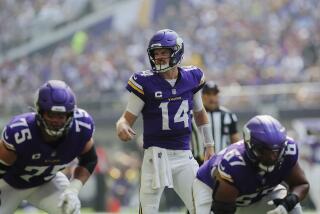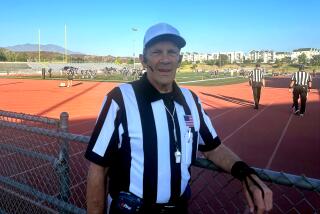Walsh Learns It Doesn’t Take a Genius to Be a Broadcaster : Television: But the former 49er coach is working hard to improve his technique as an NBC analyst.
- Share via
When he was coaching, Bill Walsh was called a genius. Now, as he begins his second year as a broadcaster, the genius tag is gone.
“He’s got potential,” his supporters say.
Others aren’t as kind.
Maybe Walsh thought it would be easy. He had worked hard and mastered coaching, so he would do the same thing with broadcasting, as his longtime friend, John Madden, did.
It hasn’t worked out quite the same for Walsh.
There have been times when he has asked himself, “What have I done? What have I gotten myself into?”
It’s not that Walsh has embarrassed himself as a football commentator. All things considered, he is doing all right. But John Madden, he’s not.
Walsh, 58, is proud of what he accomplished as a coach, as he should be. In his first year as leader of the San Francisco 49ers, they went 2-14. Two years later, they won the Super Bowl--the first of three under Walsh during the 1980s.
Now the question is, can he show similar improvement in the broadcast booth?
This is an important year for Walsh. His bosses at NBC expect improvement. They took a chance on him. Now they’re looking for a payoff.
NBC won’t cover a Super Bowl until January of 1993. They want Walsh to be more polished by then.
During a recent interview, Walsh seemed determined to make it.
And if he doesn’t?
Then it’s on to career No. 3, whatever it might be, or back to coaching.
“I don’t think going back to the 49ers is a possibility, and I’m really too entrenched in the Bay Area to leave (to take a coaching job),” he said. “Maybe a small-college job in the area someplace, but that’s really remote. I really don’t think there is such a school.
“The problem is, I’d tell myself to relax and low-key it, but I know I’d end up wanting to win just as bad as I did with the 49ers.”
Walsh acknowledged that he misses coaching.
“It’s like someone who gets out of prison after 30 years and doesn’t know what to do and has trouble adjusting to the outside world,” he said. “You’re a little lost.
“After more than 30 years in coaching, you become accustomed to certain routines. At the time, you may not like a lot of things. But after you leave, it’s hard to adjust, particularly if you’ve reached a certain stature, which I think I did.”
But for now, his mind is mostly on broadcasting.
Asked which areas he needs to work on, Walsh shook his head and said, “Everything.”
NBC has done its part, providing him with plenty of rehearsal time before he worked a game last season, and even hiring a voice teacher to work with him.
“The problem with my voice is it starts to get higher and higher as I talk,” Walsh said. “Someone will tell me not to worry about it, to concentrate on the content, then someone else will tell me my voice needs work.”
Walsh has been hearing more criticism from his NBC bosses this season.
“Last year, I was the coach of the Super Bowl champions, and treated with a certain reverence,” he said. “Now I’m just another broadcaster and easier to approach.”
Walsh became a successful coach through hard work. Can he do the same in broadcasting?
“I don’t know,” he said. “Sure, I work hard, but it takes more than that. It takes a certain knack.
“Last year, I may have worked too hard. I’d end up with notes everywhere, too many notes. Now I’m learning to edit out what isn’t important.”
He said putting names with numbers has been tough.
“In coaching, I never worried about it,” he said. “Either I knew a player’s name or his number. It wasn’t important to connect the two.”
It was in June of 1989 that Dick Ebersol, NBC sports’ new president, and Terry O’Neil, the new executive producer, approached Walsh about a job. They never offered him anything but the No. 1 commentator’s job alongside Dick Enberg.
Five months earlier, Walsh had stepped down as coach of the 49ers and taken the position of executive vice president of football operations.
Ebersol and O’Neil believed that they had to go to him with their best shot.
“You can’t say, ‘Bill, we’d like you to do four or five regional games on our seventh team the first two years and we’ll see if you’re any good,’ ” O’Neil said.
“We felt we were fortunate to get him. If that means that he got thrown into the fire a little sooner than we’d like, so be it. He’s been through pressure situations before.”
But Walsh wasn’t prepared for this kind of pressure.
“It’s pressure all right,” he said. “It may be a different kind of pressure than I was used to, but it’s pressure.
“I guess I was naive. I never realized that the announcing teams were given numbers--the No. 1 team, the No. 2 team and so on. That’s very important to the people in the business.
“Heck, I used to think Madden worked a lot of our games just because he lived in the area.”
Walsh said he was stunned by the egos and the politicking in his new profession.
“I just wasn’t aware of it,” he said. “There are some very nice people in this business, but there are some people who think they set the standards for broadcasting. I’ve been amazed.”
Are the egos bigger than in coaching?
“I’d say so, although there’s some pretty big egos in coaching, too. I don’t want to name names, but I can think of a couple of coaches who just can’t resist drawing attention to themselves.”
Walsh is courteous and easy to like. During a two-hour interview over breakfast at an Anaheim hotel, a fan would occasionally come by to say hello or ask for an autograph. Walsh would go out of his way to make the person feel at ease, always saying, “Have a nice day.”
Walsh comes to Southern California frequently. He is a native of Los Angeles. His mother, Ruth, lives in Huntington Beach, and he has a sister there, too.
Walsh attended Los Angeles Washington High, where he was the B-team quarterback when a senior named Hugh McElhenny was the star of the varsity.
Walsh was the starting varsity quarterback as a junior, but his father, who was in the auto body repair and painting business, moved the family to Oregon with three games remaining in the season.
The Walsh family moved again, this time to Hayward in the Bay Area, where Bill finished high school. By then, because of his 10-flat speed in the 100, he had been converted to a running back.
After high school, it was on to San Mateo Junior College and then San Jose State, where he played both offense and defense as an end.
Coincidentally, his first coaching job, in 1957, was at Washington High--but in Fremont, not Los Angeles. He took over a team that was 1-26, and by his second season had a 9-1 conference champion.
Later there were assistant coaching jobs with California, the Raiders, Stanford, the Cincinnati Bengals and the San Diego Chargers before he became head coach at Stanford in 1977.
Two years later, he became coach of the 49ers, again turning a loser into a winner.
Now he is facing a different kind of challenge.
“I know I could never be another John Madden,” he said. “I could never copy his style. I just hope that people become accustomed to the way I do a game and that someday my style will be the accepted style.”
More to Read
Go beyond the scoreboard
Get the latest on L.A.'s teams in the daily Sports Report newsletter.
You may occasionally receive promotional content from the Los Angeles Times.










